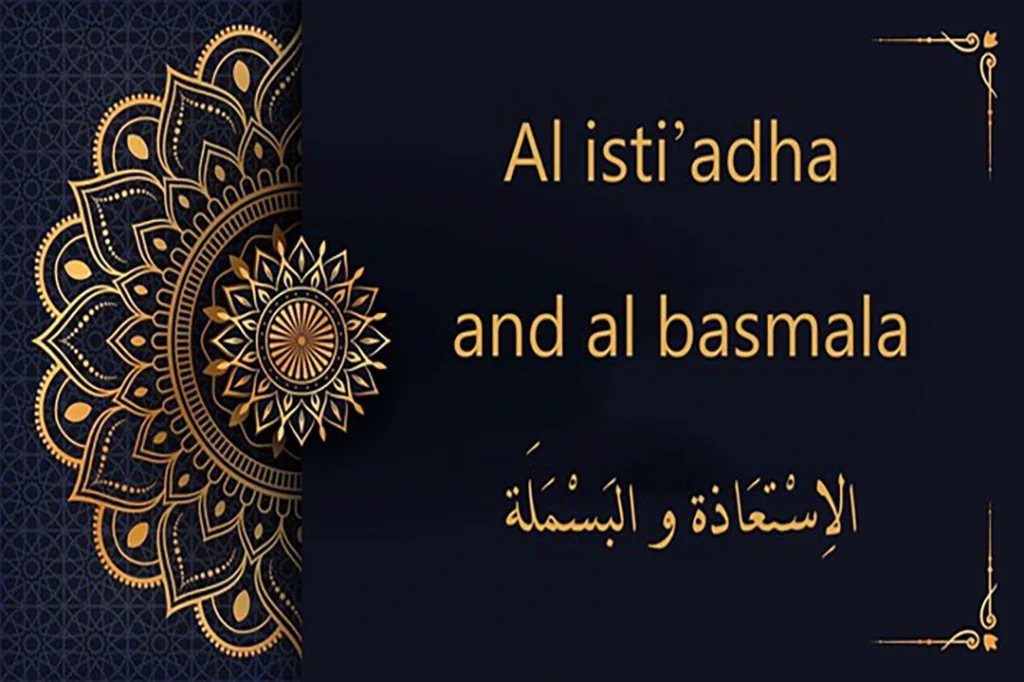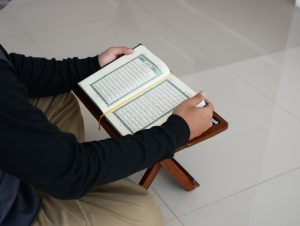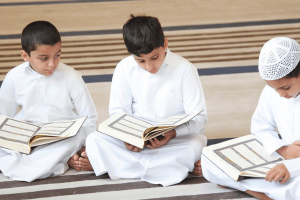He who either does fraud with a Muslim, or harms him, or tricks with him, is not of us (Ahlulbayt).
Ali ibn Musa al-Rida (as)
Table of Contents
ToggleBoth phrases carry profound meanings and are integral to various acts of worship, particularly in the recitation of the Quran. Understanding their significance, linguistic roots, and practical applications enriches one’s spiritual practice and connection to Allah.
Al Isti’adha: Definition and Meaning
Al Isti’adha (الاستعاذة) is a significant concept in Islam that refers to seeking refuge or protection in Allah from the accursed Shaytan (Satan). This act of seeking refuge is a spiritual and devotional practice meant to safeguard oneself from the whisperings, temptations, and evil influences of Shaytan. The common phrase for Al Isti’adha is:
أعوذ بالله من الشيطان الرجيم (A’udhu billahi min al-shaytan al-rajim)
This Arabic phrase translates to “I seek refuge with Allah from the accursed Satan.” It is a supplication that Muslims recite to express their dependence on Allah for protection against the malevolent intentions and disruptions caused by Shaytan.
The practice of Al Isti’adha is deeply rooted in the teachings of the Quran and the traditions of the Prophet Muhammad (peace be upon him). One of the foundational Quranic injunctions that emphasize the importance of seeking refuge in Allah is found in Surah An-Nahl (16:98):
“So when you recite the Quran, seek refuge in Allah from Satan, the expelled [from His mercy].” (Surah An-Nahl 16:98)
This verse highlights the necessity of seeking protection from Shaytan, especially when engaging in the recitation of the Quran.
The act of reciting Al Isti’adha before beginning the recitation of the Quran serves as a shield against any negative interference from Shaytan, ensuring that the recitation is pure and focused.
The Importance and Benefits of Al Isti’adha
- Spiritual Protection:
o Al Isti’adha acts as a spiritual shield, safeguarding the believer from the harmful effects of Shaytan’s whisperings and influences. It helps maintain the sanctity of the believer’s thoughts and actions, keeping them aligned with the teachings of Islam. - Strengthening Faith:
o By regularly seeking refuge in Allah, a believer reinforces their dependence on and trust in Allah’s power and mercy. This continuous reminder of Allah’s protection strengthens one’s faith and fosters a deeper spiritual connection. - Mental and Emotional Peace:
o The recitation of Al Isti’adha helps in calming the mind and emotions, particularly in times of stress, anxiety, or temptation. It serves as a reminder that Allah is always there to provide support and protection, alleviating feelings of fear and uncertainty. - Purity of Worship:
o Seeking refuge in Allah before acts of worship, such as praying or reading the Quran, ensures that these acts are performed with a pure heart and mind, free from any distractions or corruptions instigated by Shaytan.
pplication in Daily Life
Muslims are encouraged to recite Al Isti’adha in various situations throughout their daily lives. Some common instances include:
- Before Reciting the Quran:
- As emphasized in Surah An-Nahl 16:98, reciting Al Isti’adha before Quranic recitation helps protect the recitation from any satanic interference.
- During Prayer:
- Before starting the Salah (prayer), Muslims recite Al Isti’adha to ensure their focus and devotion are directed solely towards Allah.
- In Times of Temptation or Weakness:
- Whenever a believer feels tempted to commit a sin or experiences weakness in their faith, reciting Al Isti’adha can help resist these negative influences and seek Allah’s guidance and support.
- In Difficult Situations:
- During moments of hardship, anxiety, or fear, invoking Al Isti’adha provides comfort and reassurance of Allah’s presence and protection.

Al Basmalah: Definition and Meaning
Al Basmalah (البسملة) refers to the recitation of the phrase بسم الله الرحمن الرحيم (Bismillah-ir-Rahman-ir-Raheem), which translates to “In the name of Allah, the Most Gracious, the Most Merciful.” This phrase holds immense significance in Islam and is recited at the beginning of various acts of worship and daily activities to invoke Allah’s blessings and protection.
Linguistic Analysis of Al Basmalah
- Bismillah:
- The phrase begins with “Bismi” (بِسْمِ), meaning “in the name of.” This indicates that the action being undertaken is initiated with the name of Allah, emphasizing that every act is performed with the recognition and invocation of Allah’s presence. This not only signifies the start of the action but also sanctifies it, aligning it with divine will and purpose.
- Ar-Rahman:
- “Ar-Rahman” (الرَّحْمَٰنُ) refers to Allah’s vast and universal mercy. It denotes the boundless and all-encompassing nature of Allah’s mercy that extends to all of creation, without discrimination. Ar-Rahman represents a mercy that is profound and limitless, covering every aspect of existence.
- Ar-Raheem:
- “Ar-Raheem” (الرَّحِيمِ) emphasizes Allah’s specific mercy towards the believers. While Ar-Rahman denotes the universal mercy of Allah, Ar-Raheem highlights the particular, nurturing mercy that Allah bestows upon those who believe and follow His guidance. It suggests a continuous, personal mercy that is intimately connected to the needs and circumstances of the believers.
Virtues and Importance of Al Basmalah
- Recognition of Allah’s Sovereignty:
- By reciting Al Basmalah, a believer acknowledges Allah as the ultimate source of all blessings, power, and success. It is a declaration of faith that Allah is the One who grants the ability and means to perform any action. This recognition fosters a sense of humility and dependence on Allah, reinforcing the belief that nothing can be achieved without His will and support.
- Barakah (Blessings):
- Al Basmalah invokes barakah, or blessings, in daily activities. Whether it is starting a meal, embarking on a journey, beginning a task, or engaging in worship, reciting Al Basmalah brings divine blessings and protection. It ensures that the action is suffused with Allah’s grace, making it more likely to succeed and be beneficial.
- Sign of Faith:
- The recitation of Al Basmalah is a reflection of a believer’s consciousness of Allah and His omnipresence. It serves as a reminder that every action, no matter how mundane, is an opportunity to connect with Allah and seek His guidance. This constant awareness strengthens the believer’s faith and devotion, fostering a deeper spiritual connection with Allah.
Application in the Holy Quran
Al Isti’adha and Al Basmalah are often recited together before starting the recitation of the Noble Quran. Al Isti’adha, which is the invocation of seeking refuge in Allah from Shaytan, is commanded by Allah in Surah An-Nahl (16:98):
“So when you recite the Quran, seek refuge in Allah from Satan, the expelled [from His mercy].”
While Al Isti’adha is not written in the Quranic text, its recitation is essential for seeking protection from the accursed Shaytan.
On the other hand, Al Basmalah is written at the beginning of every surah (chapter) of the Grand Quran, except for Surah At-Tawbah. This practice underscores the importance of beginning every chapter with the name of Allah, invoking His mercy and blessings.
The presence of Al Basmalah at the beginning of almost every surah signifies its profound importance in the Islamic faith. It serves as a constant reminder of Allah’s mercy and the need to invoke His name in all matters.
The exception of Surah At-Tawbah, which begins without Al Basmalah, is also significant and has been a subject of various interpretations and discussions among scholars. Some believe it signifies the stern and serious nature of the surah, which deals with themes of disobedience and divine retribution.

Daily Applications and Spiritual Impact
Beyond its presence in the Pure Quran, Al Basmalah is integrated into the daily lives of Muslims. It is recited before performing any act, whether religious or mundane, to ensure that the act is blessed and protected by Allah.
For example, Muslims recite Al Basmalah before eating, drinking, writing, entering or leaving the house, and even before starting their vehicles.
The consistent recitation of Al Basmalah helps Muslims maintain a continuous awareness of Allah’s presence and mercy.
It acts as a spiritual anchor, aligning their actions and intentions with divine guidance. This practice not only enhances the spiritual quality of their daily lives but also instills a sense of gratitude and humility.
Rules of Recitation in Tajwid
In Tajwid (Tajweed) (the science of Quranic recitation), specific rules govern the pronunciation and combination of Al Isti’adha and Al Basmalah. For instance:
- Connecting Al Isti’adha to Al Basmalah: This involves smoothly transitioning between the two without a pause.
- Pausing After Al Isti’adha: This allows distinct recitation of each phrase.
Historical and Spiritual Perspectives
Al Isti’adha: Historical and Spiritual Perspectives
Al Isti’adha (الاستعاذة), which is seeking refuge in Allah from Shaytan (Satan), has a deep-rooted historical and spiritual significance in Islam. The common phrase used for Al Isti’adha is:
أعوذ بالله من الشيطان الرجيم (A’udhu billahi min al-shaytan al-rajim)
Historical Perspective
The practice of Al Isti’adha dates back to the early days of Islam. The Prophet Muhammad (peace be upon him) taught his followers to seek refuge in Allah from the evil of Shaytan, acknowledging the latter’s persistent attempts to mislead and deviate humans from the righteous path.
The Glorious Quran itself provides guidance on this practice, notably in Surah An-Nahl (16:98):
“So when you recite the Holy Quran, seek refuge in Allah from Satan, the expelled [from His mercy].”
This verse underscores the importance of seeking protection from Shaytan, especially during the recitation of the Pure Quran.
Historically, Muslims have adhered to this practice as a means to purify their hearts and minds, ensuring that their recitation and understanding of the Noble Quran are not tainted by any negative influences.
Spiritual Perspective
Spiritually, Al Isti’adha serves several profound purposes:
- Protection from Evil:
- By seeking refuge in Allah, believers acknowledge their vulnerability to Shaytan’s whispers and temptations and turn to Allah for protection. This act reinforces the believer’s trust in Allah’s power to protect them from all forms of evil.
- Purity of Intentions:
- The recitation of Al Isti’adha before engaging in religious activities, especially Quranic recitation, helps in purifying one’s intentions and focusing solely on Allah. It clears the mind of distractions, allowing for a more sincere and devoted engagement with the divine words.
- Strengthening Faith:
- Regularly seeking refuge in Allah strengthens a believer’s faith and dependence on Allah. It serves as a constant reminder of Allah’s omnipotence and the believer’s need for His guidance and protection.
Al Basmalah: Historical and Spiritual Perspectives
Al Basmalah (البسملة) refers to the recitation of the phrase بسم الله الرحمن الرحيم (Bismillah-ir-Rahman-ir-Raheem), meaning “In the name of Allah, the Most Gracious, the Most Merciful.”
Historical Perspective
The recitation of Al Basmalah has been a foundational practice in Islam since its inception. The phrase appears at the beginning of every surah (chapter) of the Sacred Quran, except for Surah At-Tawbah.
This consistent inclusion highlights its importance and the emphasis placed on starting every act with the name of Allah.
Historically, the Prophet Muhammad (peace be upon him) emphasized the recitation of Al Basmalah before undertaking any task, whether significant or mundane.
This practice was ingrained in the daily lives of early Muslims, serving as a reminder of Allah’s presence and blessings in every aspect of life.
Spiritual Perspective
- Invocation of Divine Blessings:
- By reciting Al Basmalah, believers invoke Allah’s blessings and mercy upon their actions. This invocation ensures that the actions are carried out with divine support and guidance, increasing their likelihood of success and barakah (blessings).
- Recognition of Allah’s Sovereignty:
- Starting any act with Al Basmalah acknowledges Allah’s ultimate control and sovereignty over all things. It is a declaration of humility and dependence on Allah, recognizing that no action can be fruitful without His will and support.
- Spiritual Focus and Mindfulness:
- The recitation of Al Basmalah before daily activities and acts of worship fosters a sense of spiritual focus and mindfulness. It aligns the believer’s intentions with divine purpose, ensuring that their actions are performed with a pure heart and sincere devotion to Allah.
Integration in Daily Life
Al Isti’adha and Al Basmalah are integrated into the daily lives of Muslims in various ways:
- Before Reciting the Grand Quran:
- Al Isti’adha is recited to seek protection from Shaytan, while Al Basmalah is recited to invoke Allah’s blessings and mercy upon the recitation.
- During Prayer:
- Al Basmalah is recited at the beginning of Surah Al-Fatiha, the opening chapter of the Holy Quran recited in every unit of the prayer (Salah).
- In Daily Activities:
- Muslims recite Al Basmalah before eating, drinking, starting a journey, or beginning any task. This practice ensures that all actions are started with the remembrance of Allah.
- In Times of Difficulty:
- During moments of fear, anxiety, or temptation, reciting Al Isti’adha provides comfort and assurance of Allah’s protection and guidance.
Tajwid Courses in DarulQuran Academy
DarulQuran Academy offers comprehensive Tajwid (Tajweed) courses designed to help students master Quranic recitation.
These courses emphasize the correct pronunciation of Al Isti’adha, Al Basmalah, and other essential aspects of Quranic recitation.
With expert instructors, personalized feedback, and structured lessons, students of all levels can enhance their Tajwid skills, deepening their connection to the Glorious Quran.
In Conclusion Al Isti’adha and Al Basmalah are more than mere phrases; they are profound acts of worship that reflect a believer’s faith, reliance on Allah, and spiritual awareness.
Their recitation before Quranic recitation and other daily acts ensures protection, blessings, and divine guidance.
Learning their proper recitation through Tajwid (Tajweed) courses, such as those offered at DarulQuran Academy, empowers Muslims to connect deeply with their Creator and the Quran’s message.

















